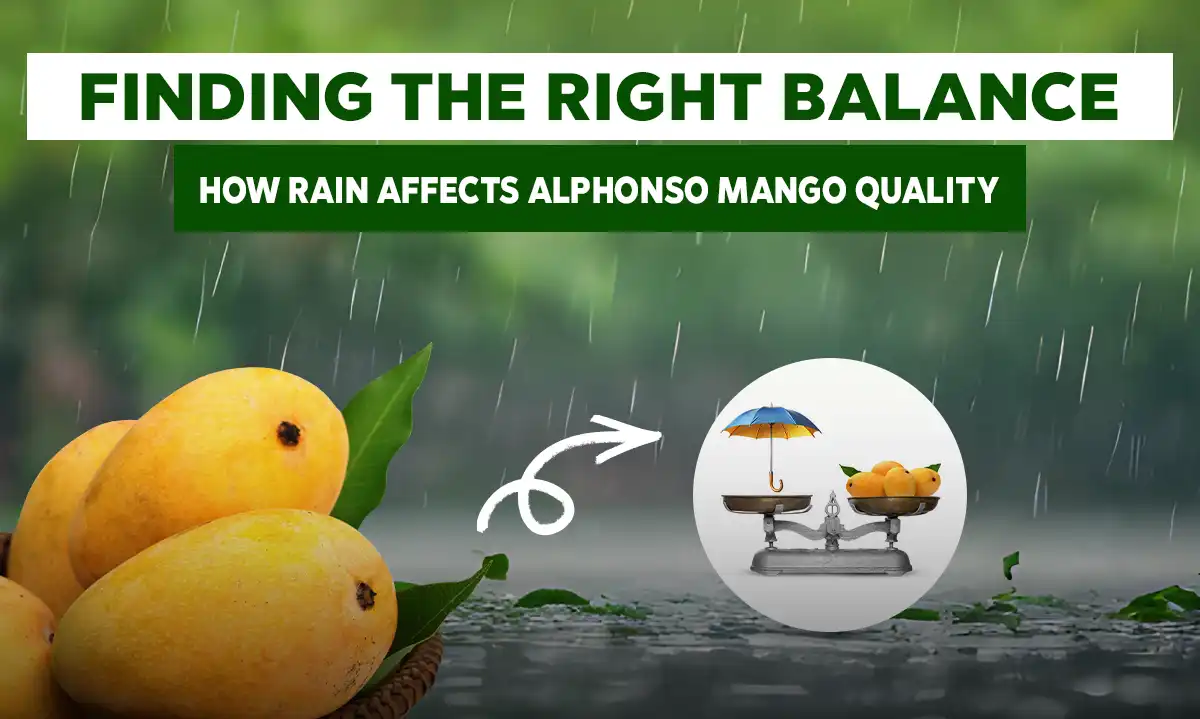Balancing Rainfall: Strategies for Improving Alphonso Mango Quality

Introduction
Mangoes from Alphonso, also known as the "king of fruits," are prized for their buttery texture, rich flavor, and aromatic scent. Mostly grown in India's Konkan area, these mangoes are highly sought-after both domestically and abroad. However, the weather, particularly rainfall, greatly influences the careful balancing act required to grow the ideal Alphonso mango. Growing Alphonso mangoes on mango farmland requires producers to understand how rain impacts fruit quality in order to produce the best fruit possible. This blog provides insights into preserving the best possible fruit quality while delving into the complex relationship between rain and Alphonso mangoes.
Rain Effect on the Quality of Alphonso Mangoes
The Significance of Regulated Rainfall
Alphonso mangoes require a specific rainfall balance to thrive. The amount and timing of the rain have a direct impact on the fruit's quality on mango farmland. Here's how to do it:
Fruit Set and Flowering: Alphonso mangoes normally set fruit in the early spring after flowering in the winter. Sufficient precipitation during the blooming phase is crucial for the sound growth of flowers and the subsequent production of fruit. On the other hand, excessive rain might cause poor pollination and fruit drop.
Fruit Development: Regular, moderate rainfall is preferable after the fruit has set. Overabundance of precipitation during the fruit development stage can cause issues including fruit splitting, a decrease in sugar content, and a rise in fungal illnesses. On the other hand, a lack of rainfall might make the fruit tiny and undeveloped.
Consequences of Too Much Rain
Excessive rainfall can negatively impact the quality of Alphonso mangoes on mango farmland in multiple ways:
Fruit Splitting: Excessive rainfall can cause the soil to become wet, which compromises the fruit's ability to absorb nutrients uniformly. As a result, the mango skin may split, letting germs inside to contaminate the fruit.
Lower Sugar Content: Mangoes' distinctive sweetness develops with steady moisture levels. Excessive rain dilutes the fruit's sugar content, reducing its sweetness and flavor.
Fungal Diseases: Anthracnose and powdery mildew are two examples of fungi that thrive in an environment that is too wet. These illnesses may impact the fruit's shelf life and appearance, which will lower its market value.
Issues with Inadequate Rainfall
However, inadequate rainfall brings with it a unique set of difficulties for mango farmland:
Growth Stunting: Insufficient water can hinder fruit growth. Mangoes could stay little and never reach their maximum sweetness and flavor.
Increased Use of Pesticides: Farmers may have to use additional chemical treatments and irrigation systems to make up for water scarcity during periods of low rainfall, which can degrade the fruit's natural flavor and freshness.
Extended Dry Spells: Extended dry spells can put mango trees under stress, resulting in lower fruit set and yields. Trees under stress may also provide smaller, less flavorful fruits.
Controlling Rainfall to Get the Best Mango Quality
Soil and Water Management
Alphonso mangoes on mango farmland depend on efficient soil and water management techniques to keep their ideal moisture balance:
Drainage Systems: Putting in place suitable drainage systems helps avoid flooding during periods of intense precipitation. Ensuring proper drainage eliminates surplus water from the soil, thereby reducing the risk of fungal infections and fruit splitting.
Irrigation Techniques: During dry spells, supplemental irrigation can help keep moisture levels steady. Drip irrigation systems provide water straight to the roots of the plants, saving nourishment and guaranteeing that the mangoes get enough moisture.
Soil Health: By adding organic matter and using the right fertilizer, you can keep your soil healthy and improve its capacity to hold and control moisture. Rich, well-drained soil promotes strong mango tree growth and fruit development.
Time and Observation
Weather Forecasting: Farmers can better prepare for possible rainfall problems by keeping up with weather patterns and forecasts. By modifying irrigation schedules and drainage strategies in accordance with weather forecasts, farmers can lessen the effects of unexpected rains on mango farmland.
Frequent Monitoring: Regularly monitoring fruit growth stages and soil moisture levels enables timely interventions. This may entail making modifications to watering techniques or implementing disease-prevention measures.
Disease Control
Control of Fungal Diseases: The use of fungicides and maintaining proper orchard cleanliness are effective methods for managing fungal diseases that can worsen due to excessive moisture. Ensuring adequate ventilation for the mango trees and avoiding overhead watering can also reduce the risk of disease.
Integrated Pest Management: Strategies can effectively control pests that prefer high moisture levels. Frequent examination and prompt treatment can shield the fruit from pest damage on mango farmland.
Towards the Future: Adjusting to Climate Change
Rainfall patterns are changing due to climate change, so Alphonso mango growers on mango farmland must adapt.
Climate-Resilient Farming Practices: Creating and implementing climate-resilient farming techniques can assist in mitigating the effects of shifting precipitation patterns. This entails investing in drought-tolerant cultivars, boosting water-saving strategies, and strengthening soil health.
Research and Innovation: Ongoing studies on mango production in climate-variable environments can yield fresh perspectives and innovative solutions for better controlling precipitation and preserving fruit quality.
Conclusion
Finding the right balance of rain is crucial to producing high-quality Alphonso mangoes. Both excessive and insufficient rainfall can adversely affect fruit quality, leading to issues such as fruit splitting, reduced sweetness, and increased disease risk. By implementing effective soil and water management practices, staying informed about weather conditions, and adopting disease management strategies, growers can optimize their production on mango farm land and ensure the best possible mango quality. As climate change continues to impact rainfall patterns, adapting to these changes and investing in innovative practices will be essential for maintaining the excellence of Alphonso mangoes in the future.
Latest blogs
JOIN OUR COMMUNITY !
Stay connected with Getfarms! Follow us on social media for the latest updates, exclusive offers, and a glimpse into the world of farmhouse living. Join our community today




























